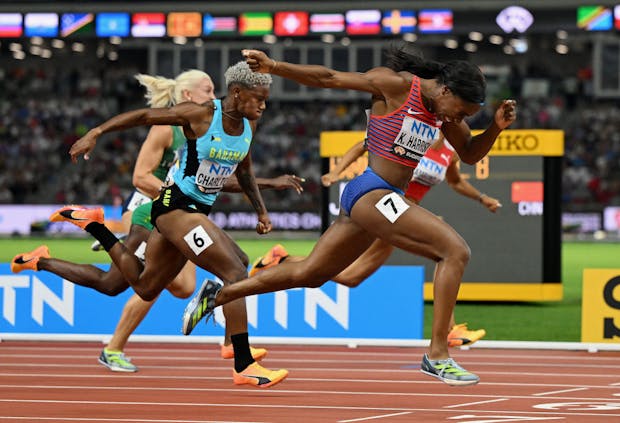
Investment conversations that continue to be held by World Athletics are with global players and are being sparked by ongoing revamps to the sport to maintain its audience engagement, according to Sebastian Coe, the body’s president.
Under Coe, the federation has placed an emphasis on overhauling formats to remain relevant with a young audience. The latest plans involve a calendar revamp, changes to the long jump to eliminate “down time” and a global international event to be added in 2026.
Speaking during a press conference ahead of the World Indoor Championships in Glasgow this weekend, Coe said that “hedge funds, venture capitalists and organisations that want to put fresh resource into our sport” welcome the landscape World Athletics has created across reforms, integrity and financial viability.
Fielding a question from SportBusiness as to the progress of the investment search, and if Saudi Arabia’s Public Investment Fund (PIF) is among the parties being spoken to, Coe said that “conversations are taking place at a global level and pretty much on every continent”.
He said: “We made a strategic decision to grow the sport organically. We felt there were income streams we could tap in to. The 2026 event is coming along really well and will make a huge difference. It allows us to have a global event every year.”
The new in-stadium track event would take place during the one year out of every four-year cycle that there is neither a World Championships nor an Olympic Games. It would also create more inventory opportunities for external investment.
At its Council meeting in Glasgow, World Athletics also decided that, from 2025, the season will end with the World Championships.
Coe stressed: “We have a responsibility to futureproof the sport to continue to create the landscape, financially particularly. We’ve recruited some world-class businesses in the last few weeks. They do not routinely want to join enterprises they think are going in the wrong direction.”
He warned that change was not optional.
“The holy grail of every sport is to remain salient, interesting and exciting to young people,” said the former chairman of the London 2012 organising committee. “We’re not going to frame the sport entirely around them but we can’t have a tin ear in their direction.
“We have to recognise that the way people consume sport and entertainment is different than it was even three years ago. And we have to move with that.”
Coe has previously appeared receptive to the idea of Saudi backing but warned that packed stadiums and a legacy plan would need to be ensured if the World Championships were ever awarded to the Kingdom. In 2019, the World Athletics Championships in Doha, Qatar attracted a spate of negative press due to tiny crowds at the 40,000-seat Khalifa Stadium.
Asked specifically if World Athletics is talking to PIF, Coe replied: “Yes, there are some global discussions going on and I’m comforted by that.”
This week, PIF unveiled a five-year sponsorship deal with the Association of Tennis Professionals but stopped short of investing in equity.
In 2022, World Athletics reported total equity and reserves of $43.5m (€40.2m), down from $60.7m in 2021. Of its $54.9m in annual revenues, $48.7m stemmed from broadcast rights and sponsorship deals.
World Athletics and the Dentsu agency hold an ongoing 10-year media and sponsorship rights contract, which includes the sale of rights to the World Athletics Championships, as well as other events such as the World Cross Country Championships. The deal runs from 2020 to 2029. The European Broadcasting Union holds the media rights in Europe and sub-Saharan Africa to 2029.
Following a profit of $29.8m reported in 2021 largely due to its healthy share of Tokyo 2020 revenues, World Athletics swung to a loss of $17.4m in 2022.
On the prospect of more proposed format changes, which include the introduction of a long jump “take-off zone” to cut down on the number of no jumps, Coe said: “Our sport is 150 years old. There are elements of it you absolutely want to protect. They are sacrosanct. [But] there is stuff there that just leaves people a little cold. We did a lot of research on the back of [the World Championships in] Budapest in stadium and watching at home. We’re still harvesting and understanding that but they’re telling us some quite key things.”
In awarding the 2027 World Athletics Championships to Beijing this week, the world body has also talked up China’s commercial potential and fanbase.